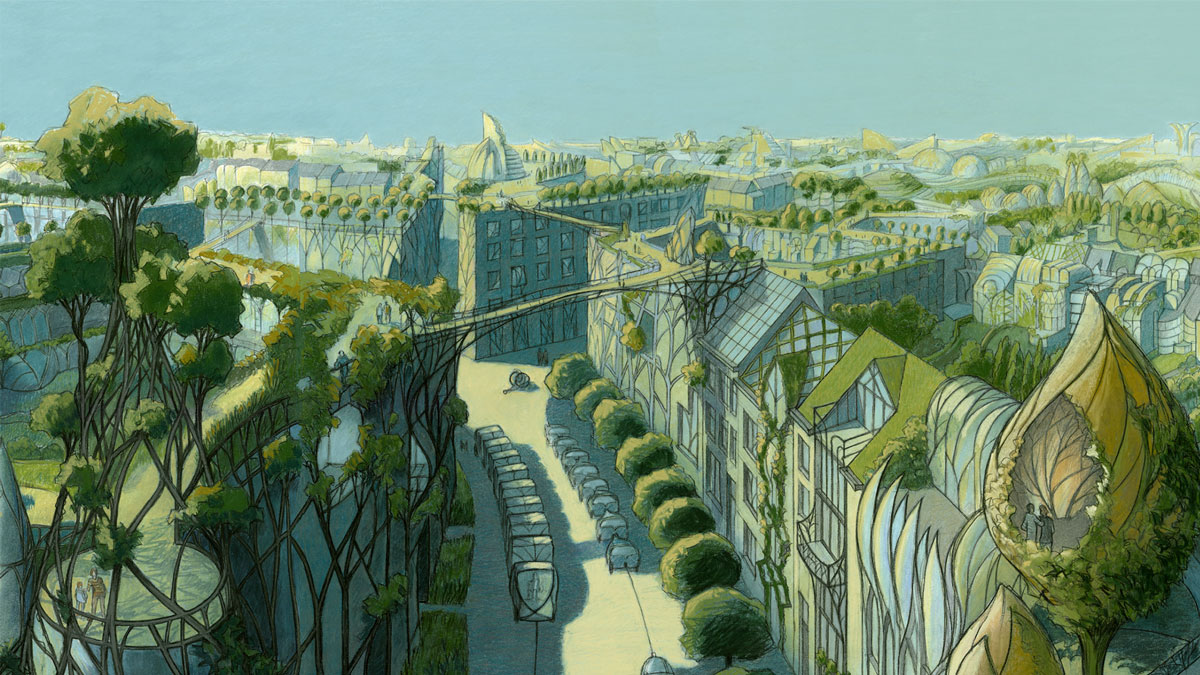
What does a sustainable civilisation look like and how do we get there? A burgeoning movement of artists and activists is seeking answers.
“It is 2050. In most places in the world, the air is moist and fresh, even in cities. It feels a lot like walking through a forest, and very likely this is exactly what you are doing. The air is cleaner than it has been since before the Industrial Revolution. We have trees to thank for that. They are everywhere.”
In the current moment, these words from Christiana Figueres and Tom Rivett-Carnac’s 2020 book The Future We Choose might seem like pure fantasy. The world they describe seems so far from the present, where over 90% of the Earth’s population breathes air deemed unsafe by the World Health Organization, scientists warn that humans are causing “irreversible” changes to the climate and nature is declining globally at an unprecedented rate.
But a burgeoning artistic and political movement known as “solarpunk” is trying to bring this lush, verdant world closer to reality.
Solarpunk imagines an optimistic future where humans have overcome the major environmental and social crises of our time and in the process created a safe, just world powered by clean energy and organised around collaborative social ideals.
It rejects the pessimism of cyberpunk, which paints the future as a corporate-controlled and environmentally degraded dystopia. As stated in a manifesto written collectively by the online solarpunk community, “as our world roils with calamity, we need solutions, not only warnings”.
The concept of solarpunk originally emerged in the late 2000s, when a handful of artists on the social media platform Tumblr began sharing drawings of futuristic green cities. Over time, the aesthetic and ethos evolved into a more robust vision for the world, and in the process has been embraced by other art forms. There are now published collections of solarpunk literature, subgenres of music, movements within architecture and even tabletop role-playing games.
At the core of this vision is the idea that humans can coexist in harmony with the rest of nature. A solarpunk world is one where vast swathes of land have been returned to wilderness, rooftop gardens dot the skylines of high-tech cities and vertical farms provide food to their residents.
Responsible use of technology is also a prominent theme. Solar, wind and wave power have entirely replaced fossil fuels as sources of energy, while widespread 3D printing has made it much easier to produce things locally, creating resilient, self-sufficient communities.
Increasingly, artists and writers in the solarpunk movement also describe a world that is just and safe for marginalised groups – especially those facing the brunt of the climate and ecological crisis today. “BIPOC [black, indigenous and people of colour] and queer people are safe in solarpunk futures,” says Brianna Castagnozzi, co-editor-in-chief of Solarpunk Magazine.
Although it may seem utopian and idealistic, solarpunk attempts to answer real questions being asked more and more often in light of the unfolding climate and ecological crisis. What can be saved? What does a truly sustainable civilisation look like? How do we get there?
It may be a big ask, but it’s increasingly clear that the scale of the environmental crises facing humanity demands transformational changes to the way we live, as well as the way we think. Art has the power to shape our attitudes, so perhaps it’s time – as Nigerian poet Ben Okri said recently – for artists of all kinds to “dedicate our lives to nothing short of re-dreaming society”.
This article was originally published on China Dialogue by Joe Coroneo-Seaman under the Creative Commons BY NC ND licence.
Related Articles:
- The Earthly Frontier: Building a Sustainable Future at Home
- Beating the Heatwaves: a Sensual Solution to Satisfy your Limbic System
- For 150 Years Oil was Everything – Our Life, Our Economy: Now It’s Time to Imagine a New Way
- This Climate Solution is a Sleeping Giant
- Microgrids and Distributed Solar Energy can Change our Future
Find books on Music, Movies & Entertainment and many other topics at Bookshop.org
Lynxotic may receive a small commission based on any purchases made by following links from this page
